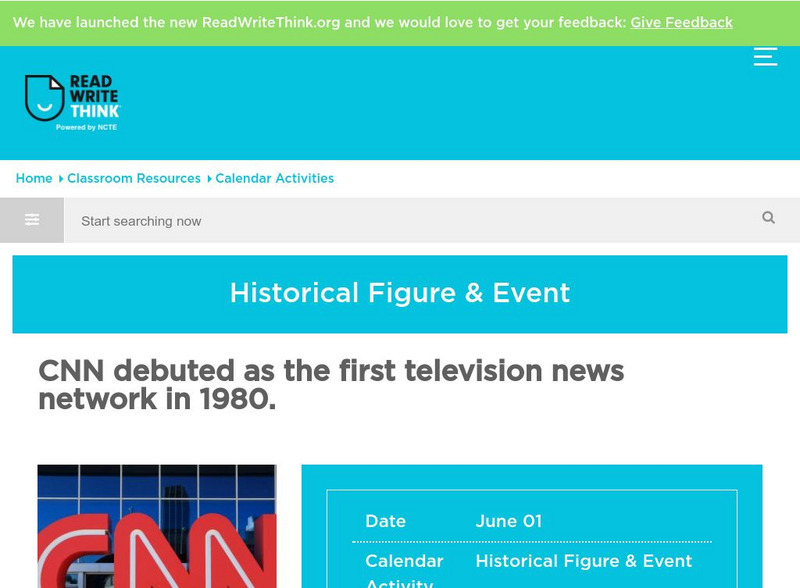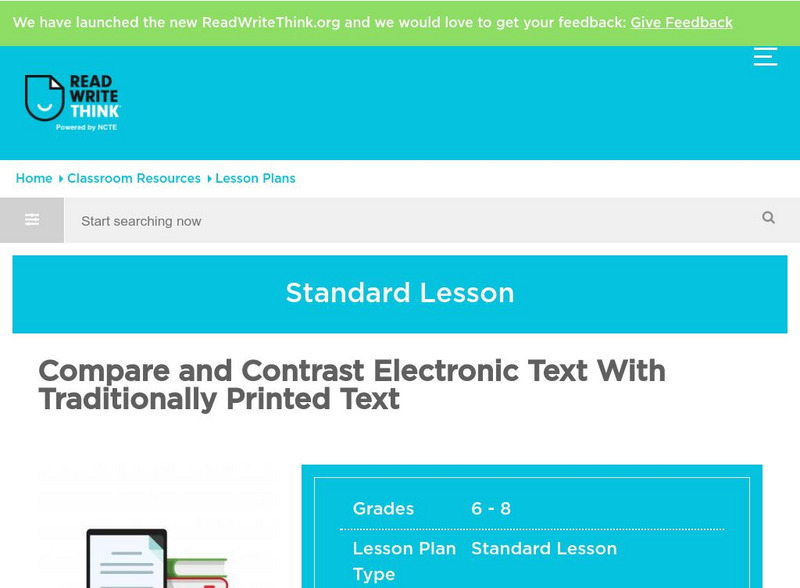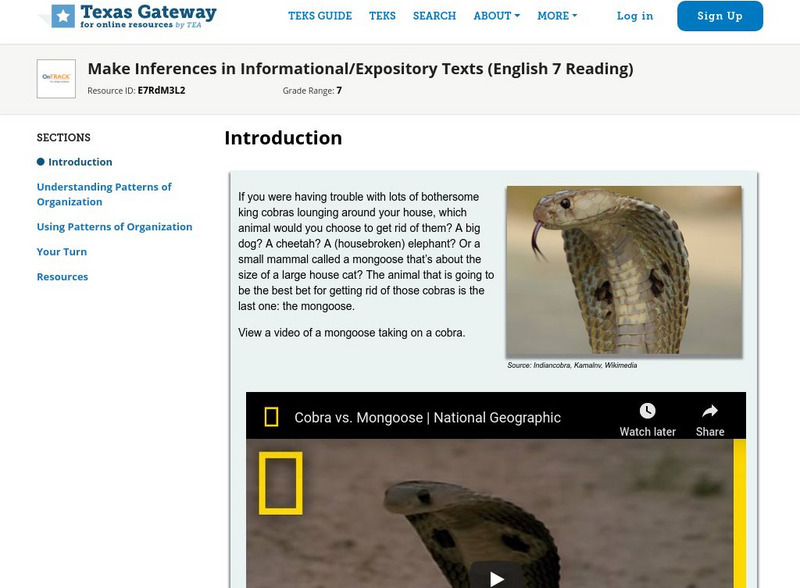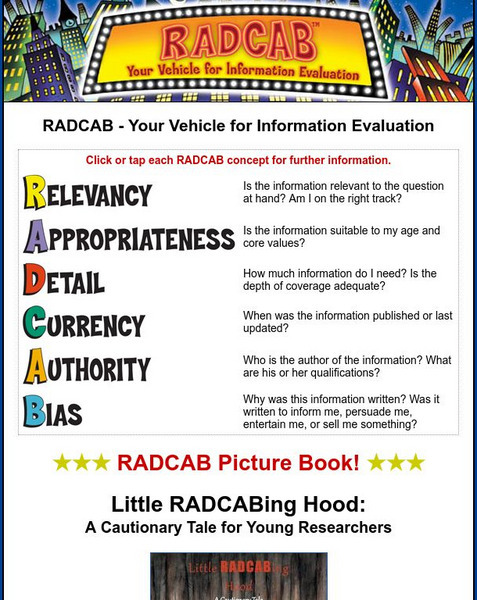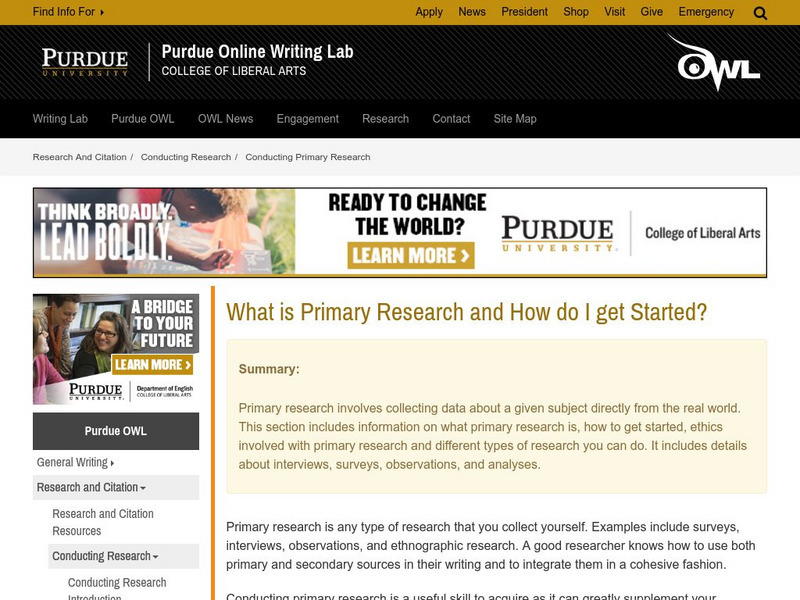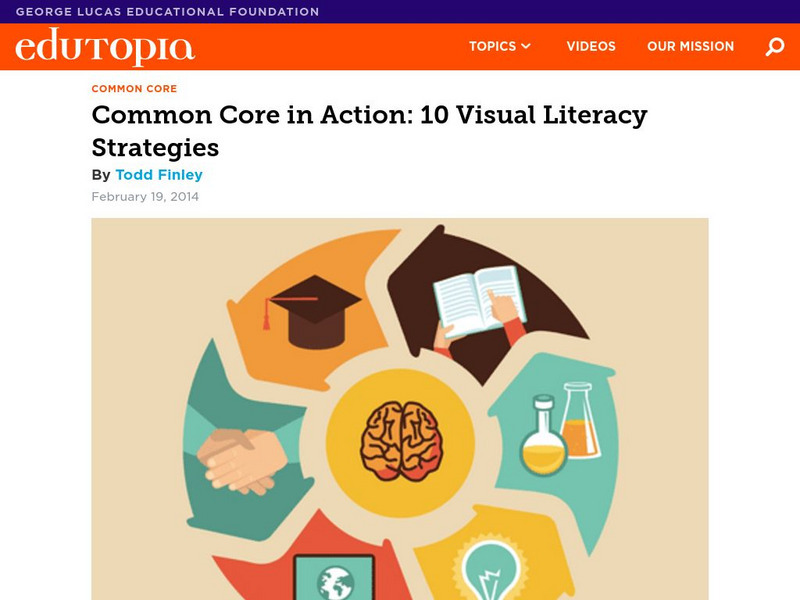Other
New York State Library: Student Activity: Primary Versus Secondary Sources
Read about the Railroad Strike of 1877 using three excerpts from textbooks and three original newspaper articles. Compare and contrast the information in the primary and secondary sources.
ReadWriteThink
Read Write Think: Cnn Debuted as the First Television News Network in 1980
These lesson plans relate to the gathering and production of news and creating a visual timeline. There are links to other lesson plan ideas, as well as web links, and a brief bibliography. SL.11-12.2 Eval&Integrate sources
ReadWriteThink
Read Write Think: Compare/contrast Electronic Text With Traditionally Printed Text
Lesson allows for middle school students who are familiar with researching electronic sources to gain a deeper understanding of the benefits of online resources versus traditional print.
Other
Fair: Retractions of Reporting Are Quite Selective
Interesting essay on the use of unnamed or anonymous sources, accuracy of reports, and retractions of innaccurate reports by major news outlets. Eye opener.
Texas Education Agency
Texas Gateway: Make Inferences in Informational/expository Texts
[Accessible by TX Educators. Free Registration/Login Required] Use different organizational patterns as guides for summarizing and forming an overview of different kinds of expository text while distinguishing factual claims from...
Texas Education Agency
Texas Gateway: Contrast Media's Message With Traditional Text English I Reading
Compare and contrast how visual and non-visual texts communicate information.
Texas Education Agency
Texas Gateway: Compare Narrative and Informational Texts: Practice 1
Evaluate changes in audience, purpose, and tone in two different texts.
Other
Ire: Investigative Reporters and Editors
This non-profit group was created in 1975 as a networking tool for the exchange of ideas and attitudes concerning the quality of investigative reporting for the media. Site is newsletter-style with up-to-date information.
CommonLit
Common Lit: The Scientific Method
A learning module that begins with "What Is a Rocket" by NASA, accompanied by guided reading questions, assessment questions, and discussion questions. The text can be printed as a PDF or assigned online through free teacher and student...
CommonLit
Common Lit: "The Nature vs. Nurture Debate" by Common Lit Staff
A learning module that begins with "The Nature vs. Nurture Debate," accompanied by guided reading questions, assessment questions, and discussion questions. The text can be printed as a PDF or assigned online through free teacher and...
American Geosciences Institute
American Geosciences Institute: Earth Science Week: What Lies Beneath the Upper Crust?
Students use the Integrated Ocean Drilling Program as an example to help them find ways of checking science news stories for accuracy. They are given a science news story and instructed to investigate the accuracy of the claims made in...
Other
Learning Farm: Compare and Contrast Informational Texts
In this narrated tutorial, students are presented with information about first and third points of view, then read two passages about the same event and answer questions that compare how the topic is presented. After completing the...
University of North Carolina
University of North Carolina: The Writing Center: Scientific Reports
A handout exploring how to complete a scientific report based on scientific research. The site describes the sections needed as well as how to insert graphs and tables.
Texas Education Agency
Texas Gateway: Synthesize Ideas in Informational/expository Text
[Accessible by TX Educators. Free Registration/Login Required] In this lesson, you will expand on your ability to read texts, synthesize them, and make choices based on the information you read. Finally, you will learn how to use textual...
Other
Radcab: Your Vehicle for Information Evaluation
How do you know you are using a trustworthy source when writing a research paper? Use this acronym for easy questions to ask yourself to make sure you have a reliable source. Click on each one for further details.
Online Writing Lab at Purdue University
Purdue University Owl: What Is Primary Research and How Do I Get Started?
Learn the difference types of primary sources and how to use them as a part of your research.
Other
Power Up What Works: Conducting Research
This resource describes the first phase of a Grade 6 teacher's lesson where young scholars develop a plan for working on a research project and then collect information. Each student has chosen a topic relating to how the economic...
Khan Academy
Khan Academy: Activity: Evaluating Writing
Students can learn how to grade an essay with a rubric in this activity. The essay is a sample from Big History essay called "Early Earth". The goal of this activity is for students to understand the rubric so they can write their own...
Other
Central Michigan University: Website Research: Fake News
Critical appraisal tests like CRAAP and RADAR can also be used to evaluate the credibility of news websites and the stories they produce (which often go viral on social media). Here are some more resources to help you check! (CRAAP...
Edutopia
Edutopia: Common Core in Action: 10 Visual Literacy Strategies
Explicitly teach a collection of competencies that will help students think through, think about, and think with pictures.
ReadWriteThink
Read Write Think: Inquiry on the Internet: Evaluating Web Pgs for Class Collection
A four-session lesson plan that leads to a class collection of resources is a solid introduction to both searching skills and evaluation. Could be used with any number of subject areas.
Other
Gallaudet University: English Works: Guide to Different Types of Essays
English Works site has suggestions on how to write an essay to convey helpful information. This site offers examples of eight different types of essays and graphic organizers.
Curated OER
Mc Graw Hill: Informational Text: Compare Text Structures
This learning module focuses on comparing organizational patterns in informational texts including chronological order, compare and contrast, cause and effect, and problem and solutions. Click on each text structure for an explanation.
University of California
Cal Heritage Collection: Using Primary Sources
This resource covers what primary sources are, where we can find them, and how we can assess them in the classroom.



